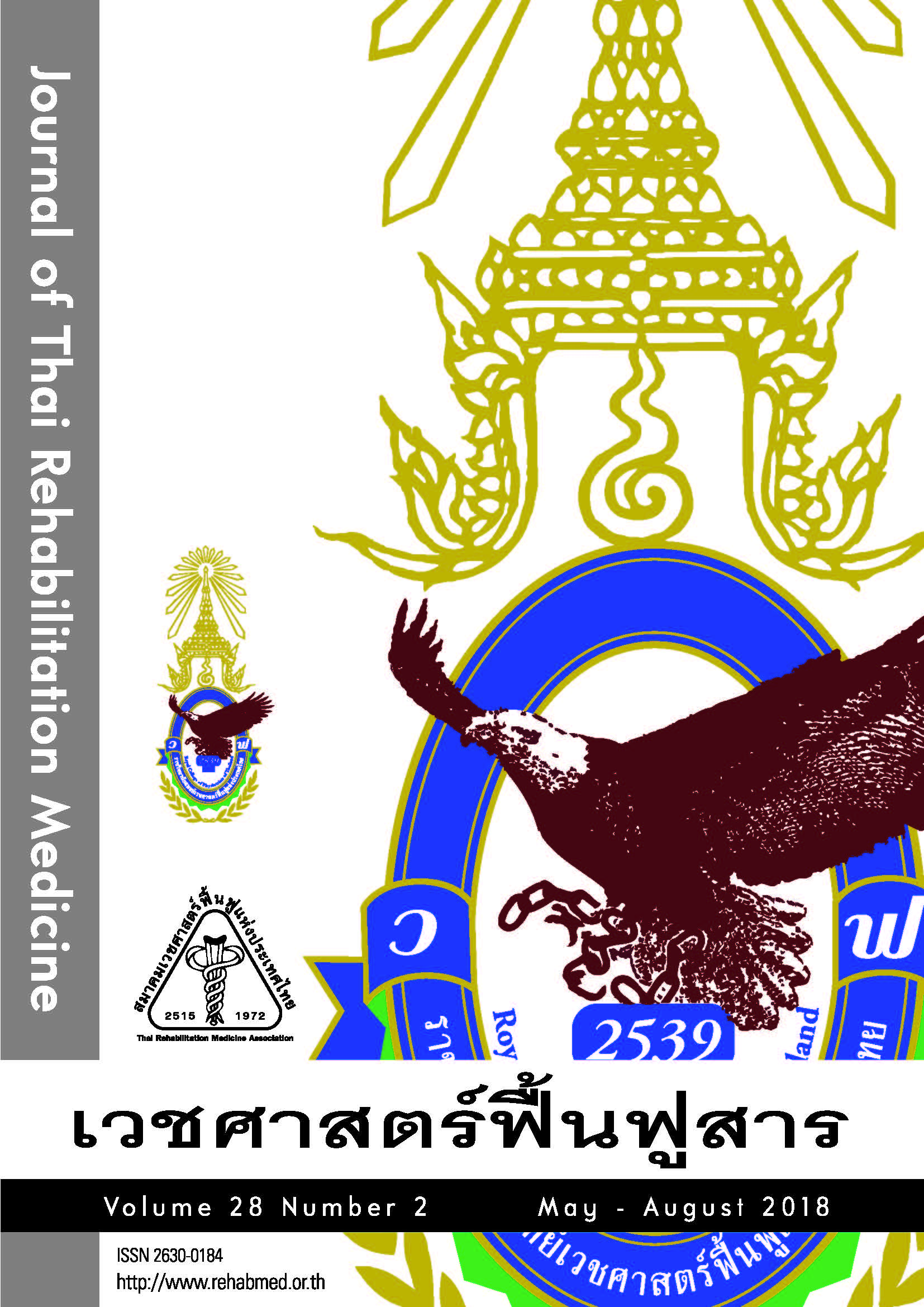ความชุกและปัจจัยที่เกี่ยวข้องกับความรู้สึกเป็นภาระของผู้ดูแลหลักของผู้ป่วยเด็กพิการ ในสาขาเวชศาสตร์ฟื้นฟูเด็ก คณะแพทยศาสตร์ศิริราชพยาบาล
ความชุกและปัจจัยที่เกี่ยวข้องกับความรู้สึกเป็นภาระของผู้ดูแลหลักของผู้ป่วยเด็กพิการ ในสาขาเวชศาสตร์ฟื้นฟูเด็ก คณะแพทยศาสตร์ศิริราชพยาบาล
Keywords:
primary caregiver, children with chronic condition, caregiver burden, quality of lifeAbstract
Objectives: To study prevalence of caregivers’ feeling of burden in disable children and related factors.
Study design: Cross-sectional study
Setting: Division of Pediatric Rehabilitation Siriraj hospital
Subjects: Sixty-one main caregivers of children with disabilities.
Methods: Caregivers completed the questionnaires consisting of general demographic data of children and caregivers, the Zarit Burden Interview (Thai version) and the WHOQOL-BREF-THAI. Children medical data were retrieved from their medical records.
Results: Average age of children was 3.75 years old. The two common diagnoses were cerebral palsy (37.7%) and genetic diseases (24.6%). 93.2% needed caregiver to assisted activities of daily living. 72.1% of the caregivers were mothers with mean age of 36.02 (SD 8.7) years old. Average time spending for caregiving was about 20.5 (SD 5.4) hours per day. Only 45% of the caregivers felt burden in taking care of their children. Mean score of Zarit Burden Interview was 23.13 (SD14.07; min 6 max 72), and mean quality of life score was 92.14 (SD 11.75; min 64 max 115). The Pearson correlation between caregivers’ burden score and quality of life score (r) was -0.452 (p<0.05). Higher burden score found in caregiver who work fulltime in addition to their routine caregiving (p=0.046), who care older children (p=0.042) as well as children with intellectual impairment (p=0.030). Factor related to low caregivers burden score were the high score of quality of life (p=0.003), caregiver cerebral palsy(p=0.030). Caring children with good(p=0.038) and fair(p=0.021) feeding skill as well as children with visual problem(p=0.030) are also associated with low burden score.
Conclusion: 45% of caregivers in this study feel burden regarding to their caregiving work. Factors related to burden were type of work, quality of caregiver’s life, children age, children with cerebral palsy, intellectual impairment, and children with visual problem.
References
1. Ministry of Social Development and Human Security. Department of Empowerment of Persons with Disabilities. Prevalence of disabilities patient in 2017 [Internet]. 2017 [cited 2017 Oct]. Available from: http://dep.go.th
2. Data Resource Center for Child & Adolescent Health. 2011–2012 National Survey of Children With Special Health Care Needs 2015[Internet]. 2015 [cited 2016 Jul 8]. Available from: http://www.childhealthdata.org/learn/NS-CSHCN
3. Javalkar K, Rak E, Phillips A, Haberman C, Ferris M, Van TM. Predictors of caregiver burden among mothers of children with chronic conditions. Children. 2017;39:1-10.
4. Lerthattasilp T. Depression and caregiver burden among caregivers of children with autistic spectrum disorders at Thammasat University Hospital. Pathum Thani: Thammasat University; 2012.
5. Orapiriyakul R, Benjakul W, Kwunkaew S. Predictors of burden of care in primary family caregivers of children with autism in the West Coast Southern Thailand. Songklanagarind J Nurs. 2014;34:39-57.
6. Chadchavalpanichaya N, Harnphadungkit K, Tosayanonda O. Mental health status in caregiver of Down’s syndrome children. J Thai Rehabil Med. 2000;10:65-75.
7. Yodpet S. Caregivers of older persons: knowledge synthesis. Bangkok: Faculty of Social Administration; 2006.
8. Zarit SH, Todd PA, Zarit, JM. Subjective burden of husbands and wives as caregivers: a longitudinal study. Gerontologist. 1986; 26:260-6.
9. United Nations, Office of the United Nations High Commissioner for Human Rights. Convention on the Rights of the Child, G.A. Res. 44/25, U.N. GAOR, 44th Sess., Supp. No. 49, U.N. Doc. A/44/49 (Nov 20)[Internet]. 1989. [cited 2016 Jul 8]. Available from: http://www.ohchr.org/EN/pages/home.aspx
10. Pineda-Frutos MF, Jiménez-Báez MV, Márquez-González H, Jiménez-Márquez A, Jaime-González H, Sandoval-Jurado L, et al. Prevalence of burden, family dysfunction and depression in primary caregiver of pediatric patients with disabilities. J Fam Med Dis Prev. 2016;2:1-5.
11. Toonsiri C, Sunsern R, Lawand W. Developmental of the burden Interview for caregivers of patients with chronic illness. J Nurs Educ. 2011;4:62-75.
12. Mahatnirunkul S. WHOQOL-BREF-THAI. Ching mai: Suan Prung Psychiatric Hospital. 2002
13. Salvador A, Crespo C, Martins AR, Santos S, Canavarro MC. Perceptions about their child’s illness in pediatric cancer: links with caregiving burden and quality of life. J Child Fam Stud. 2015;24: 1129-40.
14. Pedersen SD, Parsons HG, Dewey D. Stress levels experienced by the parents of enterally fed children. Child Care Health Dev. 2004;30:507-13.
15. Greer AJ, Gulotta CS, Masler EA, Laud RB. Caregiver stress and outcomes of children with pediatric feeding disorders treated in an intensive interdisciplinary program. J Pediatr Psychol. 2008;33:612-20.
16. Wilken M. The impact of child tube feeding on maternal emotional state and identity: a qualitative meta-analysis. J Pediatr Nurs. 2012;27:248-55.
17. Heyman MB, Harmatz P, Acree M, Wilson L, Moskowitz JT, Ferrando S, et al. Economic and psychologic costs for maternal caregivers of gastrostomy-dependent children. J Pediatr. 2004; 145:511-6.
18. Soumitra S, Paul S, Seetha C. Burden among the caregivers of children with intellectual disability. J Learn Disabil. 2002;6:337-50.
19. Simsek IE, Erel S, Simsek TT, Uysal SA, Yakut H, Yakut Y, et al. Factors related to the Impact of chronically disabled children on their families. Pediat Neurol. 2014;50:255-61.
20. Marron EM, Redolar-Ripoll D, Boxixados M, Guillamon N, Hernandez E, et al. Burden on caregivers of children with cerebral palsy: predictors and related factors. Univ Psychol. 2012;12:767-77.
21. Bhatia MS, Srivastava S, Gautam P, Saha R, Kaur J. Burden assessment, psychiatric morbidity, and their correlates in caregivers of patients with intellectual disability. East Asian Arch Psychiatry. 2015;25:159-63.
22. Tseng MH, Chen KL, Shieh JY, Lu L, Huang CY, Simeonsson RJ. Child characteristics, caregiver characteristics, and environmental factors affecting the quality of life of caregivers of children with cerebral palsy. Disabil Rehabil. 2016;38:2374-82.






